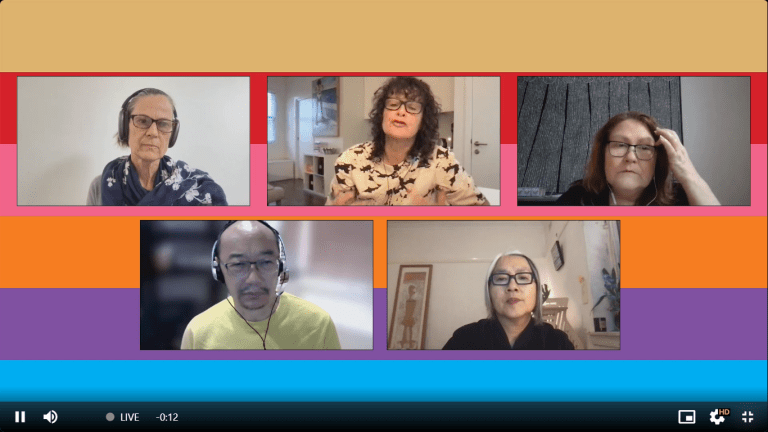Some of Australian drama’s recent triumphs were used to examine the relationship between development processes and international success at Series Mania Melbourne on Thursday.
Clickbait and Fires co-creator Tony Ayres, ABC head of scripted production Sally Riley, Matchbox Pictures scripted development director Debbie Lee, and Fires co-creator Belinda Chayko joined journalist Sandy George for a discussion about how ideas are shaped from the writers’ room to production.
Fires, the ABC anthology series about the Black Summer bushfires, served as a key point of reference throughout the conversation, partly due to its relatively quick journey from the first writers’ room in March 2020 through to production in Melbourne and regional Victoria earlier this year.
Chayko said the “incredibly fast” development period required the full attention of people that knew what they were doing.
“In order to fit into that timeframe, we had to be really smart about how we did it,” she said.
“Our initial room was just with a really small group of people – Tony, me, Jacquelin Perske, Andrea Denholm and Liz Watts – so we had very experienced people in the room to start with and that was really key for us to be able to develop really quickly and to stay focused on what we had to do, which is one of the most important things in the room.

“You’ve got to have space to play but you also need to have a focus, which came from Tony and I as the creators, but also by having very experienced people in the room.”
For Ayres, the experience showed how important the dynamic of a writers’ room could be.
“Where it works best, from my experience, is when there is some kind of referee or author or decision maker who can go ‘Yes, but no’,” he said.
“In the writers room for Fires, Belinda would be there to say ‘Yes but no, let’s just try that again’.
“And if we missed the target, it was her job to tell us we missed the target. I think you need that because it can be difference between something that shows a high degree of sensibility, skill and craft, which is what most of us want to watch these days.”
Ayres was tasked with catering to a wider audience as the showrunner on Clickbait, which was the first Netflix original series to be produced in Victoria.
The eight-part US-set limited series topped the Netflix rankings in more than 20 countries since its premiere on the streaming service in August, while also making it in the overall top ten lists of more than 80 countries.
Ayres, whose company Tony Ayres Productions (TAP) produced Clickbait with Matchbox Pictures and Heyday Television, said while the American system was “much more hierarchical”, he liked being able to employ other writers as producers throughout the process.
“It felt like you had your little squad and I really liked that,” he said.
“I also liked being the boss, which can put more pressure on you, but sometimes in our system there are negotiations that need to happen, and that’s respectful and important.”

He added that producing for a global streamer did not impact his level of authority.
“Part of being the boss is the relationship with the broadcaster,” he said.
“If you have to override something from page one then you do it.”
It’s a scenario Riley knows all too well in her role with the ABC, where she has to field the “probably 150 pitches” that come through in a year.
Speaking about the Australian process, she identified early money to develop a series outline as an aspect that was often lacking.
“At the moment, people are focusing on getting their shows financed, so they’ll only really focus on episodes one and two and it’s like, ‘What about the rest of the series?’
“I think writers need to be patient. It would so great to have a longer process, particularly in that brainstorming period, because it has shrunk in the last few years, due to money and how we do things here.
“I think people have gotten used to it but I think the luxury of more time would be incredible.”
Lee agreed, saying the Australian industry tends to fall into a standard amount of time for brainstorming and plotting.
“We might spend a couple of days brainstorming with two, three or maybe four people – if we can stretch the budget that far to flesh out an idea,” she said.
“If we could have more time to do that sometimes, I think that would be great but that’s a financial commitment we can’t necessarily make.
“Hopefully then you get into development with a buyer, and then usually the budget you can get is three to five days for a brainstorm to flesh out the series outline and characters and then usually two days to plot a first episode.”
However, the speakers encouraged industry not ti let financial constraints affect their aspirations of reaching an international audience.
Ayres said the Australian industry had a tendency to think too small and within the framework of the budget parameter.
“We should try to start thinking bigger, but it still has to be specific – because specific is universal.
“We can think big in the way we think as well.”
Riley also emphasised the importance of not always playing it safe when it came to approaching content.
“I think ambition and risk taking can be a good thing,” she said.
“For me, character is everything and characters with an emotional journey are what we want.
“That’s what drives a show. If you want to change people’s minds about any issue, you have to move them emotionally.”


